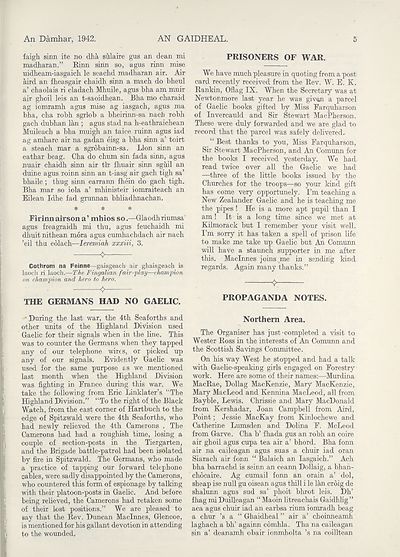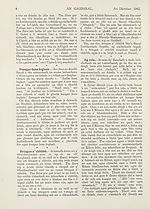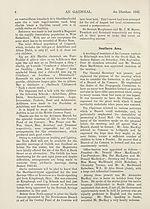Download files
Complete book:
Individual page:
Thumbnail gallery: Grid view | List view

An Damhar, 1942.
AN GAIDHEAL.
5
faigh sinn ite no dha sulaire gus an dean mi
madharan.” Rinn siiin so, a gus rinn mise
uidlieam-iasgaicli le seachd madharan air. Air
aird. an fheasgair chaidh sinn a macli do bheul
a’ cbaolais ri cladach Mhuile, agus bha am muir
air gboil leis an t-saoidbean. Bha mo charaid
ag iomramh agus mise ag iasgach, agus ma
bha, cha robh sgriob a bheirinn-sa nach robh
gach dubhan lan ; agus stad na h-eathraichean
Muileach a bha muigh an taice ruinn agus iad
ag amharc air na gadan eisg a bha sinn a’ toirt
a steach mar a sgrobainn-sa. Lion sinn an
eathar beag. Cha do chum sin fada sinn, agus
nuair chaidh sinn air tir fhuair sinn sguil an
duine agus roinn sinn an t-iasg air gach tigh sa’
bhaile; thug sinn earrann fhein do gach tigh.
Bha mar so iola a’ mhinisteir iomraiteach an
Eilean Idhe fad grunnan bhliadhnachan.
* * *
Firinn airson a’ mhios so.—Glaodhriumsa
agus freagraidh mi thu, agus feuchaidh mi
dhuit nithean mora agus cumhachdach air nach
’eil thu eolach—leremiah xxxiii, 3.
o
Cothrom na Feinne—gaisgeach air ghaisgeach is
laoch ri laoch.—The Fingalian fair-play—champion,
on champion and hero to hero.
£
THE GERMANS HAD NO GAELIC.
■ During the last war, the 4th Seaforths and
other units of the Highland Division used
Gaelic for their signals when in the line. This
was to counter the Germans when they tapped
any of our telephone wires, or picked up
any of our signals. Evidently Gaelic was
used for the same purpose as we mentioned
last month when the Highland Division
was fighting in France during this war. We
take the following from Eric Linklater’s “The
Highland Division.” “To the right of the Black
Watch, from the east corner of Hartbuch to the
edge of Spitzwald were the 4th Seaforths, who
had newly relieved the 4th Camerons . The
Camerons had had a roughish time, losing a
couple of section-posts in the Tiergarten,
and the Brigade battle-patrol had been isolated
by fire in Spitzwald. The Germans, who made
a practice of tapping our forward telephone
cables, were sadly disappointed by the Camerons,
who countered this form of espionage by talking
with their platoon-posts in Gaelic. And before
being relieved, the Camerons had retaken some
of their lost positions.” We are pleased to
say that the Rev. Duncan Maclnnes, Glencoe,
is mentioned for his gallant devotion in attending
to the wounded,
PRISONERS OF WAR.
We have much pleasure in quoting from a post
card recently received from the Rev. W. E. K.
Rankin, Oflag IX. When the Secretary was at
Newtonmore last year he was givan a parcel
of Gaelic books gifted by Miss Farquharson
of Invercauld and Sir Stewart MacPherson.
These were duly forwarded and We are glad to
record that the parcel was safely delivered,
“ Best thanks to you, Miss Farquharson,
Sir Stewart MacPherson, and An Comunn for
the books I received yesterday. We had.
read twice over all the Gaelic we had
—three of the little books issued by the
Churches for the troops—so your kind gift
has come very opportunely. I’m teaching a
New Zealander Gaelic and he is teaching me
the pipes ! He is a more apt pupil than I
am! It is a long time since we met at
Kilmorack but I remember your visit Well.
I’m sorry it has taken a spell of prison life
to make me take up Gaelic but An Comunn
will have a staunch supporter in me after
this. Maclnnes joins me in sending kind
regards. Again many thanks.”
<>
PROPAGANDA NOTES.
Northern Area.
The Organiser has just-completed a visit to
Wester Ross in the interests of An Comunn and
the Scottish Savings Committee.
On his way West he stopped and had a talk
with Gaelic-speaking girls engaged on Forestry
work. Here are some of their names:—Murdina
MacRae, Dollag MacKenzie, Mary MacKenzie,
Mary MacLeod and Kennina MacLeod, all from
Bayble, Lewis. Chrissie and Mary MacDonald
from Kershadar, Joan Campbell from Aird,
Point; Jessie MacKay from Kinlochewe and
Catherine Lumsden and Dolina F. McLeod
from Garve. Cha b’ fhada gus an robh an coire
air ghoil agus cupa tea air a’ bhord. Bha fonn
air na caileagan agus suas a chuir iad oran
Siarach air fonn “ Balaich an lasgaich.” Ach
bha barrachd is seinn an ceann Dollaig, a bhan-
chocaire. Ag cumail fonn an orain a’ dol,
sheap ise null gu oisean agus thill i le lan croig de
shalunn agus sud sa’ phoit bhrot leis. Dh’
fhag mi Duilleagan “ Maoin litreachais Gaidhlig ”
aca agus chuir iad an earbsa rium iomradh beag
a chur ’s a “ Ghaidheal ” air a’ choinneamh
laghach a bh’ againn comhla. Tha na caileagan
sin a’ deanamh obair ionmholta ’s na coilltean
AN GAIDHEAL.
5
faigh sinn ite no dha sulaire gus an dean mi
madharan.” Rinn siiin so, a gus rinn mise
uidlieam-iasgaicli le seachd madharan air. Air
aird. an fheasgair chaidh sinn a macli do bheul
a’ cbaolais ri cladach Mhuile, agus bha am muir
air gboil leis an t-saoidbean. Bha mo charaid
ag iomramh agus mise ag iasgach, agus ma
bha, cha robh sgriob a bheirinn-sa nach robh
gach dubhan lan ; agus stad na h-eathraichean
Muileach a bha muigh an taice ruinn agus iad
ag amharc air na gadan eisg a bha sinn a’ toirt
a steach mar a sgrobainn-sa. Lion sinn an
eathar beag. Cha do chum sin fada sinn, agus
nuair chaidh sinn air tir fhuair sinn sguil an
duine agus roinn sinn an t-iasg air gach tigh sa’
bhaile; thug sinn earrann fhein do gach tigh.
Bha mar so iola a’ mhinisteir iomraiteach an
Eilean Idhe fad grunnan bhliadhnachan.
* * *
Firinn airson a’ mhios so.—Glaodhriumsa
agus freagraidh mi thu, agus feuchaidh mi
dhuit nithean mora agus cumhachdach air nach
’eil thu eolach—leremiah xxxiii, 3.
o
Cothrom na Feinne—gaisgeach air ghaisgeach is
laoch ri laoch.—The Fingalian fair-play—champion,
on champion and hero to hero.
£
THE GERMANS HAD NO GAELIC.
■ During the last war, the 4th Seaforths and
other units of the Highland Division used
Gaelic for their signals when in the line. This
was to counter the Germans when they tapped
any of our telephone wires, or picked up
any of our signals. Evidently Gaelic was
used for the same purpose as we mentioned
last month when the Highland Division
was fighting in France during this war. We
take the following from Eric Linklater’s “The
Highland Division.” “To the right of the Black
Watch, from the east corner of Hartbuch to the
edge of Spitzwald were the 4th Seaforths, who
had newly relieved the 4th Camerons . The
Camerons had had a roughish time, losing a
couple of section-posts in the Tiergarten,
and the Brigade battle-patrol had been isolated
by fire in Spitzwald. The Germans, who made
a practice of tapping our forward telephone
cables, were sadly disappointed by the Camerons,
who countered this form of espionage by talking
with their platoon-posts in Gaelic. And before
being relieved, the Camerons had retaken some
of their lost positions.” We are pleased to
say that the Rev. Duncan Maclnnes, Glencoe,
is mentioned for his gallant devotion in attending
to the wounded,
PRISONERS OF WAR.
We have much pleasure in quoting from a post
card recently received from the Rev. W. E. K.
Rankin, Oflag IX. When the Secretary was at
Newtonmore last year he was givan a parcel
of Gaelic books gifted by Miss Farquharson
of Invercauld and Sir Stewart MacPherson.
These were duly forwarded and We are glad to
record that the parcel was safely delivered,
“ Best thanks to you, Miss Farquharson,
Sir Stewart MacPherson, and An Comunn for
the books I received yesterday. We had.
read twice over all the Gaelic we had
—three of the little books issued by the
Churches for the troops—so your kind gift
has come very opportunely. I’m teaching a
New Zealander Gaelic and he is teaching me
the pipes ! He is a more apt pupil than I
am! It is a long time since we met at
Kilmorack but I remember your visit Well.
I’m sorry it has taken a spell of prison life
to make me take up Gaelic but An Comunn
will have a staunch supporter in me after
this. Maclnnes joins me in sending kind
regards. Again many thanks.”
<>
PROPAGANDA NOTES.
Northern Area.
The Organiser has just-completed a visit to
Wester Ross in the interests of An Comunn and
the Scottish Savings Committee.
On his way West he stopped and had a talk
with Gaelic-speaking girls engaged on Forestry
work. Here are some of their names:—Murdina
MacRae, Dollag MacKenzie, Mary MacKenzie,
Mary MacLeod and Kennina MacLeod, all from
Bayble, Lewis. Chrissie and Mary MacDonald
from Kershadar, Joan Campbell from Aird,
Point; Jessie MacKay from Kinlochewe and
Catherine Lumsden and Dolina F. McLeod
from Garve. Cha b’ fhada gus an robh an coire
air ghoil agus cupa tea air a’ bhord. Bha fonn
air na caileagan agus suas a chuir iad oran
Siarach air fonn “ Balaich an lasgaich.” Ach
bha barrachd is seinn an ceann Dollaig, a bhan-
chocaire. Ag cumail fonn an orain a’ dol,
sheap ise null gu oisean agus thill i le lan croig de
shalunn agus sud sa’ phoit bhrot leis. Dh’
fhag mi Duilleagan “ Maoin litreachais Gaidhlig ”
aca agus chuir iad an earbsa rium iomradh beag
a chur ’s a “ Ghaidheal ” air a’ choinneamh
laghach a bh’ againn comhla. Tha na caileagan
sin a’ deanamh obair ionmholta ’s na coilltean
Set display mode to:
![]() Universal Viewer |
Universal Viewer | ![]() Mirador |
Large image | Transcription
Mirador |
Large image | Transcription
| An Comunn Gàidhealach > An Comunn Gàidhealach Publications > Gaidheal > Volume 38, October 1942--September 1943 > (13) Page 5 |
|---|
| Permanent URL | https://digital.nls.uk/125253828 |
|---|
| Description | This contains items published by An Comunn, which are not specifically Mòd-related. It includes journals, annual reports and corporate documents, policy statements, educational resources and published plays and literature. It is arranged alphabetically by title. |
|---|
| Description | A collection of over 400 items published by An Comunn Gàidhealach, the organisation which promotes Gaelic language and culture and organises the Royal National Mòd. Dating from 1891 up to the present day, the collection includes journals and newspapers, annual reports, educational materials, national Mòd programmes, published Mòd literature and music. |
|---|---|
| Additional NLS resources: |
|

